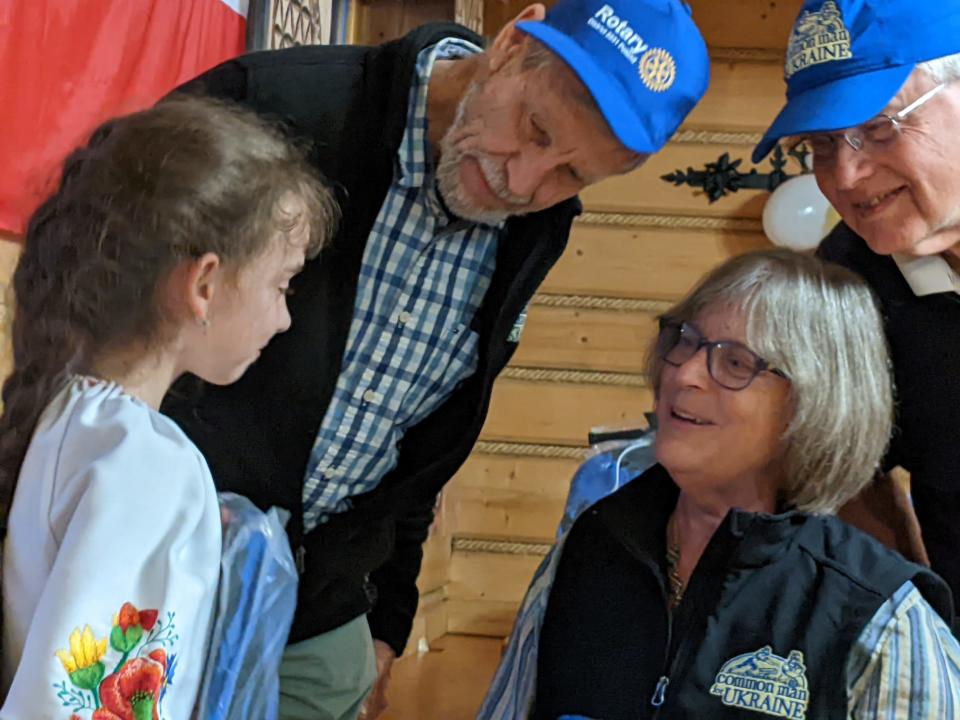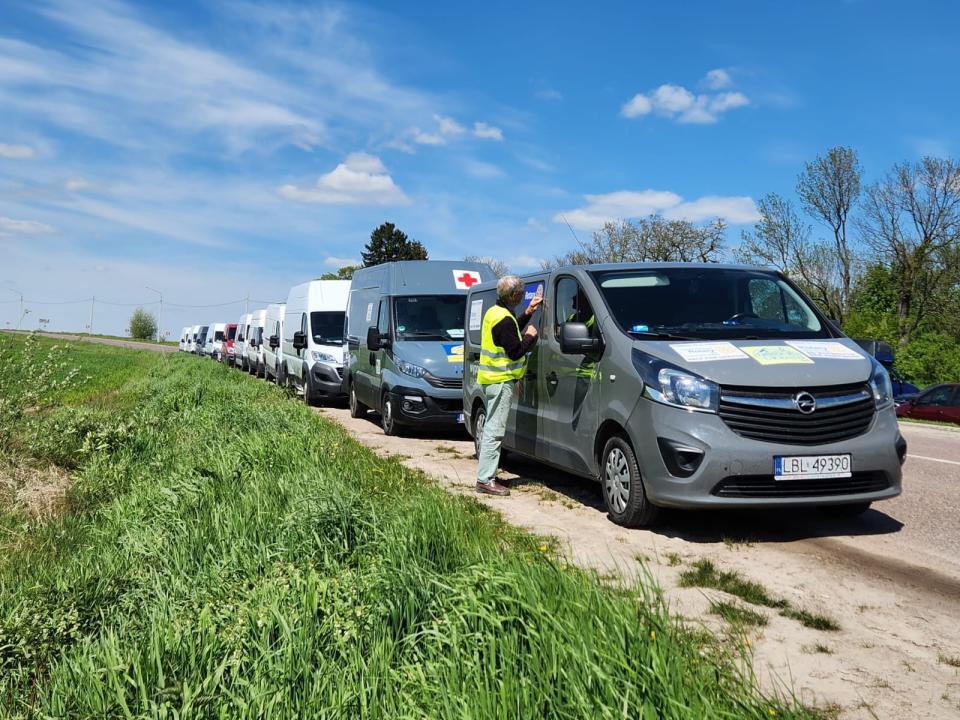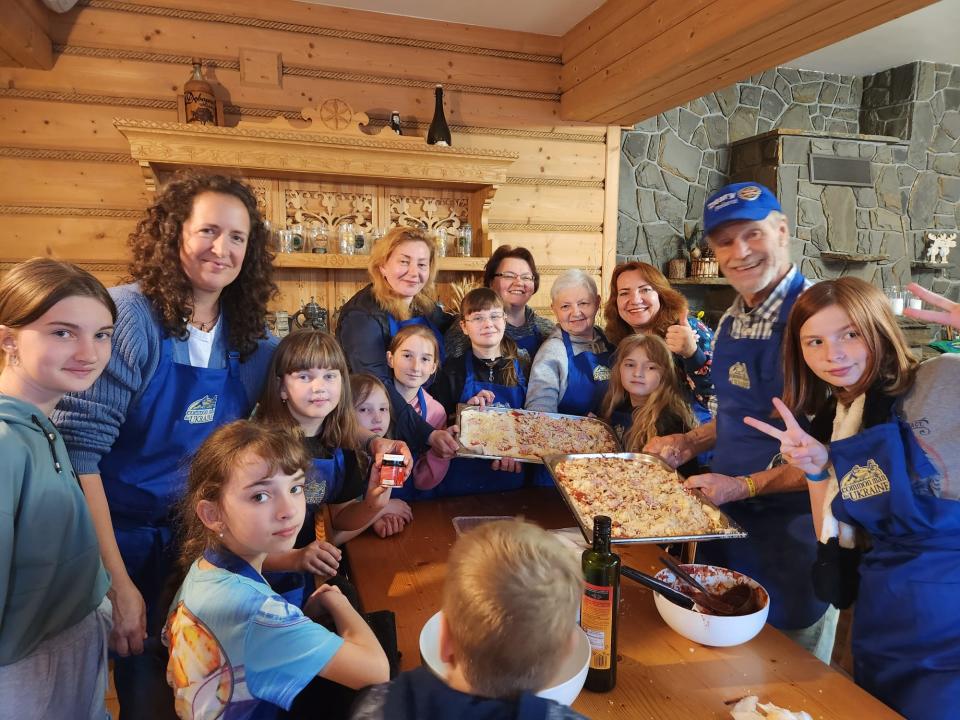In Ukraine, bullets pierce through childhood. US nonprofits are reaching across borders to help
- Oops!Something went wrong.Please try again later.
Tears flowed around the room as Alina Ilchuk's letter to Ukrainian President Volodymyr Zelenskyy was read aloud.
The 11-year-old mentioned her father, Serhiy Ilchuck, who was hailed as a hero after being fatally shot by Russian troops while evacuating around 300 Ukrainians near Kyiv about a month into the war. Alina told Zelenskyy that she and her family remain in deep mourning over her dad.
"I have a dream that the war will end because kids are growing up without their parents, like me. I really want to see my dad and hear his voice," said Alina's letter translated into English. "I really want to believe that he will come home soon, but it is not true because now he is in heaven... he will not feel any pain anymore."

Other Ukrainian kids who lost their fathers wrote similar grief-stricken and heartfelt letters to Zelenskyy. It was part of a healing exercise conducted during a retreat for 30 Ukrainian kids held last month by Common Man for Ukraine, a small New Hampshire-based humanitarian aid nonprofit. The organization funds these monthly trauma counseling and healing retreats, where about 400 kids have participated in 11 sessions in a mountainous area in Zakopane, Poland, since the war started.
"We want to help give these kids a voice, give them the power to talk about these difficult feelings," said Susan Mathison, a Common Man for Ukraine co-founder. "This too, is a part of the war that needs to be heard."
The nonprofit is among the numerous aid organizations big and small globally that fear for the mental and physical well-being of a reported more than 5 million Ukrainian children who've had their lives disrupted because of the war. Many kids with their families have fled Ukraine to other countries, including Poland, Romania, Hungary, the Czech Republic and Slovakia.
Aid workers said they are struggling to get more resources to help the kids deal with their grief, emotions, and in some cases, upheaval. Common Man for Ukraine said it may run out of funding at year's end.
"My thinking is there are about 1.5 million Ukrainian children who need support," said Dr. Irwin Redlener, co-founder of the Ukraine Children’s Action Project, a New York-based nonprofit that also provides humanitarian aid. "That's a huge number."
'These kids' pain and suffering'
The actions of these American advocates for Ukrainian kids come as Ukraine's first lady Olena Zelenska said recently in a BBC interview that the war has even taken a toll on her children. Zelenska told the network that she and her kids don't live with Zelenskyy because of the war.
"The family is separated," Zelenska said. "We have the opportunity to see each other, but not as often as we would like. My son misses his father."
Zelenska added that the uncertainty of living with war has come at an emotional cost for her children.
"It pains me to watch that my kids don't plan anything. At such an age, young people. My daughter is 19. They dream of traveling, of new sensations, and emotions. She does not have such an opportunity," Zelenska said. "There are limitations in time in what you can allow yourself, they exist, and we somehow try to live within them."

Mathison said the setbacks for Ukrainian kids living through the war led her and three others to create the Common Man of Ukraine. The nonprofit has raised nearly $3 million of its $10 million goal to provide kids with food, relief supplies and counseling since it formed last year.
"That's the collective lens we look through when we see this war," Mathison said. "These kids' pain and suffering."
'We will never be the same' Displaced Ukrainian children risk erosion in school, mental health
Need 'overwhelms the capacities' of small humanitarian aid groups
Earlier this month, Regina De Dominicis, UNICEF's regional director for Europe and Central Asia, reiterated the toll the war is having on Ukrainian children, this time after a child was reportedly killed in a market area in the Donetsk region of eastern Ukraine.
De Dominicis cited a United Nations figure that at least 1,715 Ukrainian children have either been killed or maimed since the war. She went on to say that every attack and life lost, whether it is a child or their loved ones, "etches lasting wounds deeper" into their collective mental well-being.
"This war continues to play out as a war on children, with repercussions which could reverberate for generations," De Dominicis said. "These attacks have to stop. Children must be given the chance to experience peace. Yet again, we call on all parties to protect civilians and civilian infrastructure, and to abide by their legal and moral obligations to protect children."
Both Redlener and Mathison said their nonprofits are doing what they can. Redlener said there are about a dozen or so similar groups in the United States alone that he's aware of assisting kids in Ukraine. He said those organizations work closely with overseas aid groups such as Sincere Heart in Lviv, Ukraine, the Association of Ukrainians in Victoria, Australia, Sunflowers Kids Club in the United Kingdom, and others in Western Europe and Israel.
"But even if you add up what we are all doing, it's not enough," said Redlener. "The number of Ukrainian children who need special services simply overwhelms the capacities of these organizations that want to take care of them."
He said "a devastating combination" of widespread psychological trauma and education disruption, first because of the global COVID-19 pandemic, and now "a war with no end in sight," has severely wounded Ukrainian kids.
In March, a Ukraine Children's Action Project study revealed about 28% of children were separated from a family member in the past year and 24% experienced some form of shelling or bombing. The study, which surveyed 2,000 mothers, grandmothers and guardians across the war-torn country, showed that of the Ukrainian children not attending school, 60% of their parents said it was because their kid's school was closed and another 37% said they were afraid to send them.
The study also showed that Ukrainian kids' mental health sharply declined during the war. About 55% of parents polled reported their children being bothered by loud sounds, such as bombs and gunfire, 41% of parents reported their children being irritable or apathetic and 25% of those parents surveyed said their children showed traumatic experiences participating in games or activities.
And those Ukrainian children who experienced the death of a loved one in combat only compound the trauma, Redlener believes.
"This trauma that millions of Ukrainian children are going through may impede their long-term ability to meet their optimal potential," said Redlener.
US sends billions to Ukraine Here's where it comes from, and how it adds up
Small-town Americans entering the war zone
As the Russian invasion of Ukraine intensified in early 2022, Mathison, who lives in Plymouth, New Hampshire, said she and her partner, Steve Rand, along with another couple, Alex Ray and Lisa Mure, asked each other: "What can we do to help?"
Send food? Clothes? Supplies? Cash?
All four live pretty good lives as small-town retirees. Mathison spent 30 years with the U.S. Forest Service. Ray owns a chain of popular family-owned restaurants called Common Man. Mure was a longtime public health advocate, and Rand is a third-generation owner of a century-old local hardware store.
"We've always believed in helping others and making a social impact," Mathison said. "This is a calling to us."
Local Rotary Club leaders Ray and Rand reached out to a Rotary Club in Zamosc, Poland, asking how they could help. Within days, the four co-founders of the newly created Common Man for Ukraine traveled to Poland with supplies and met with 15 Rotary presidents from the region who had projects underway or in development.
Ray then donated $1 million to the nonprofit and challenged his friends to help fundraise another $1 million in humanitarian aid. After a couple more trips to Ukraine and Poland touring makeshift orphanages and refugee and counseling centers, Common Man for Ukraine decided to focus on Ukrainian children displaced by the war.
Mathison said the on-the-ground experiences, especially seeing kids who are far from their homes, schools, and communities, are hard to ignore. Common Man for Ukraine said it has donated about 800 tons of food, 10,000 sleeping bags and hundreds of generators to orphanages and safe houses, as well as thousands of hours of counseling throughout western and central Ukraine. The nonprofit spends about $140,000 monthly, Mathison said.
She describes Ukraine as "a complex puzzle of terror and normalcy" and its people have "both fear and courage, along with an unshakable spirit" that they will win the war.
Mathison said she occasionally gets asked why is the nonprofit helping Ukrainian kids when they could help kids in the U.S. She usually responds unapologetically, mentioning she's president of her local Habitat for Humanity and each of the co-founders do charitable work domestically as well.
"I say there is enough good to go around, enough need to go around, you can do what you can do, and what these kids are going through (in Ukraine) is enough for me," she said.
Mathison said the group is further committed to Zelenskyy and humane leaders across the globe in condemning Russian President Vladimir Putin’s ongoing aggression after hearing Zelenskyy speak to the U.N. on Tuesday.
"We’ve sat in the dark, cold Ukrainian orphanages and safe houses with many of these precious children in hiding – those hoping to avoid the fate of the thousands of their kidnapped peers," Mathison said. "The look in their eyes – combining both fear and hopeful resilience – compels us to stand with these inspiring kids and provide aid for as long as they need us."
Behind the scenes: See how private ammo sales from US are fueling the war in Ukraine
'Doesn't matter what country help comes from'
Common Man for Ukraine collaborates closely with Ryszard Luczyn, a Rotary Club Zamość Ordynacki member in Poland. He helps coordinate the convoys of 20 vans delivering tons of food to orphanages and safe houses. Luczyn also helps with monthly counseling retreats in Poland's Tatra Mountains for Ukrainian children.
An insurance company owner, Luczyn told USA TODAY via email that he appreciates working side-by-side with the Common Man co-founders. He admires their 24-hour overseas trips, which typically include a flight to Warsaw, Poland, then a train ride to Lublin, Poland followed by a van ride to Chelm, Poland.
From there, the co-founders often spend a day helping Polish and Ukrainian Rotary volunteers load up vans with supplies to cross to the Ukrainian border the following day for distribution.

"Help for children is needed. It doesn't matter what country that help comes from," Luczyn said about his Common Man for Ukraine colleagues. "These four are very involved in giving aid; they personally participate in convoys, and they load and unload cars with humanitarian aid with their own hands. They risk their own lives."
Mathison said their nonprofit wants to do more than just wire funds. "We want to do the real work," she said.
'These kids will help rebuild Ukraine'
The kids who attend Common Man for Ukraine monthly retreats share an unfortunate trait. They lost a loved one to war. The kids live throughout Ukraine with their mother or other relatives. They come either by train or by bus to Lviv and are then taken by a charter bus funded by the nonprofit to Poland.
While the retreats consist of hiking, playing soccer, making arts and crafts and writing, those activities are weaved into group and individual therapy sessions. Certified psychologists, volunteer teachers and Polish Rotary club members work with the Ukrainian kids to share their thoughts, Mathison said.

The goal is to help kids cope with their grief, Mathison said. But she added some kids also can't resist looking at their phones to monitor the war's movements (and if they may have lost any loved ones) through an app called Повітряна тривога, which means "Air Alarm" in English.
"These kids will help rebuild Ukraine one day," Mathison said. "They are going to be future leaders of this country and will have to know how to deal with adversity. We want to give them the tools and the strength to be the best they can be."
One therapy exercise included the children writing their hopes and fears in letters to Zelenskyy. Tatyana Zhaga, 11, lost her father, Volodymyr Zhaga, in combat in May. She wrote that she supports the Ukrainian armed forces counterattack.
"I want to get our territories back. I, as a daughter of a hero of Ukraine, want all of our heroes to live really good and come back alive," said Tatyana's letter translated into English. "I am dreaming about a meeting with you and your family. Also, I am dreaming about our victory. Together, we are a power."
Mathison said the kids enter the retreats as strangers, "but leave as brothers and sisters. They create a network of support we hope will last a lifetime."
Luczyn said last month he delivered the children’s letters to the Ukrainian Consul in Krakow, Poland. He is confident the letters will reach Zelenskyy's office.
Mathison said she looks forward to her seventh humanitarian aid trip to the region in October, hopefully, with the news Zelenskyy has read and responded to the kids' letters and more funding to continue their efforts.
"I think we're making a small dent in an enormous problem. Our work is far from over," Mathison said. "We're not finished."
This article originally appeared on USA TODAY: Ukraine war's impact on kids growing concern as US nonprofits step in

